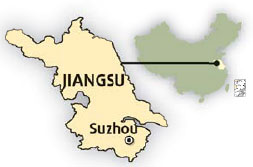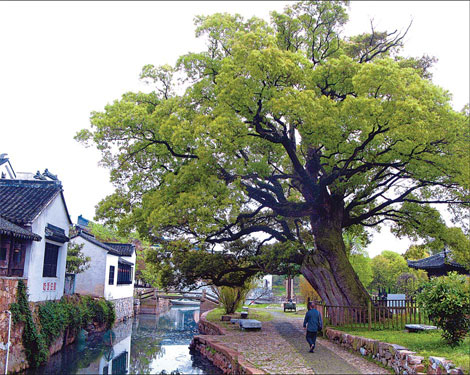Take a tea break
|
|
|
A 1,200-year-old camphor tree at the entrance of the Bright Moon Bay, an ancient village on Taihu Lake, East China's Jiangsu province. Photos by Ye Jun / China Daily |
A homestay on an island in Taihu Lake is a welcome retreat from the hustle and bustle of urban life.
My wife and I are sitting on a stone slab at a quay built 250 years ago, and watching the sunset over the vast Taihu Lake that meets the sky in the distance.
The fading sunlight dances on the ripples and time seems to have slowed.
We are enjoying a spring vacation, staying at a farmer's house on Western Hill, an island located in the middle of Taihu Lake in Suzhou, Jiangsu province. The village where we are staying has a history of over 2,000 years and a beautiful name, Bright Moon Bay.
A 1,200-year-old camphor tree, treasured by the villagers, stands at the entrance to the village, 25 meters tall and 2 meters in diameter. The tree was once hit by lightning and new branches have grown up over the withered trunk. The locals call it "grandpa carrying grandson".

A creek full of small fish runs alongside the main road, which is paved with stones. Most houses are Qing Dynasty (1644-1911) architecture with white walls and black bricks, and some old residences and ancestral shrines are now tourist attractions open to visitors.
The village, with around 100 families and 400 people, used to thrive on selling tea, fruits and fishes. But tourism has taken off in the recent years and more and more villagers are running homestays and restaurants.
After a night train from Beijing to Suzhou and a long bus ride, we finally arrived at this ancient village and met our hostess, Jiang Xiangqun, who was waiting for us at the bus station.
Taihu Lake is known for its "three whites", namely, white fish, white shrimp, and a small, semi-transparent silver fish, and on our arrival we were treated to a lunch of fresh fish, wild vegetables, free-range chicken and eggs.
The guest rooms were clean, and equipped with TV, toilet and hot shower.
The village is particularly quiet at night and we enjoyed a good night's sleep, even though the birds started singing around 5 am.
Our stay in the village was very pleasant thanks to the hospitality of our host family.
Western Hill is known for its Biluochun, one of the best green teas in the country. The tea has a prominent, refreshing fragrance, with a smooth taste.
Jiang's family has more than 1,000 tea shrubs on a hill not far from their home. On the third morning, we went to pick tea with her. The tea shrubs are planted along with various fruit trees, such as loquat, waxberry, orange and chestnut. The roots of the fruit trees have become entwined with that of the tea shrubs, which is believed to give the tea its fruity flavor.
Jiang explained that another reason the tea is so good is that it is picked only once a year in spring.
Biluochun literally means "emerald spiral spring". The story goes that the tea was given its name by Emperor Kangxi of the Qing Dynasty, when he visited Suzhou to investigate the people's living conditions.
The first batch of early spring tea is called mingqiancha, because it is picked before Qingming Festival. The tea made headlines this year when it was marketed at the end of March at a record-breaking 5,600 yuan ($819.6) per 500 grams in Beijing tea stores.
In the evening we watched Jiang's husband use a big iron cooker to turn the fresh tea leaves into dry spirals.

Shortly after he began drying the leaves a refreshing floral fragrance filled the room. It took him 40 minutes to finish a kilo of fresh leaves, which produced 400 grams of dried tea. He dried three kilos that evening. The family sells the tea to collectors from nearby tea factories.
Our three-day stay in the village was so nice that we were reluctant to say goodbye to the Jiang family.
My wife and I continued our vacation with a two-day visit to Suzhou to visit the famous gardens, and Qi Li Shan Tang, where we took a boat trip along the river that runs through the city.
But even on the boat our hearts remained with the beautiful and serene Western Hill.
 0
0 









Go to Forum >>0 Comments